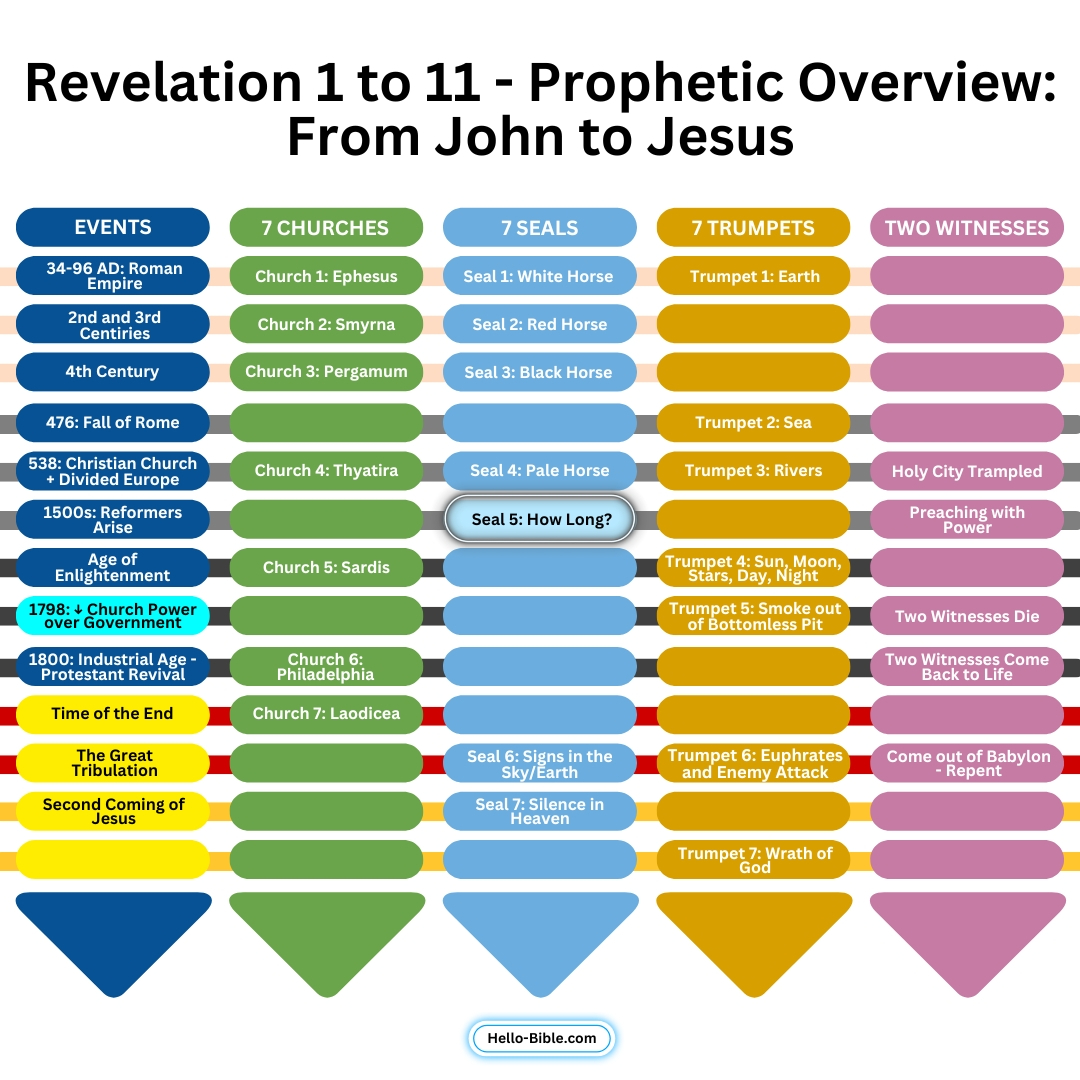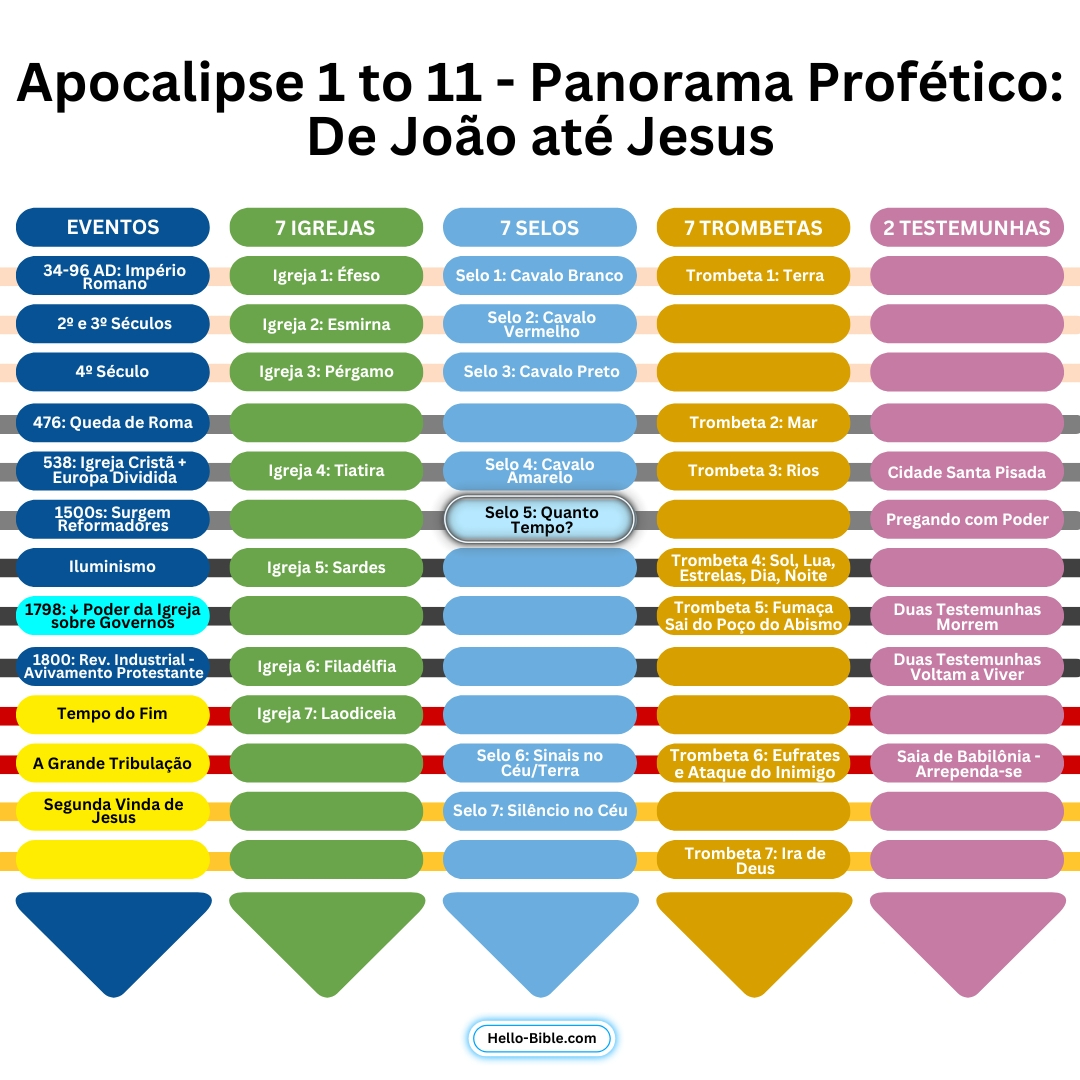9 And when he had opened the fifth seal, I saw under the altar the souls of them that were slain for the word of God, and for the testimony which they held:
10 And they cried with a loud voice, saying, How long, O Lord, holy and true, do you not judge and avenge our blood on them that dwell on the earth?
11 And white robes were given unto every one of them; and it was said unto them, that they should rest yet for a little while, until their fellow servants also and their brethren, that should be killed as they were, should be fulfilled.
Drawing Connections
At this point in the text of Revelation 6, Jesus has opened the first four seals, which brought forth four different-colored horses and their riders to complete a mission on Earth. This mission involved the acceptance or rejection of the Word of God, aiming to warn people of the consequences of rejecting God’s truth and to bring them back to Him. Visually, the first four seals are different from the last three. The first four involve horses and horsemen, with the living beings announcing the events that were to take place on Earth. The last three seals don’t involve horsemen. John, who had been witnessing the opening of the seals from the throne room in Heaven, seems to be observing the next three events as soon as Christ opens each seal.
Closer Look
*** Souls under the altar ***: John started to describe what he saw immediately after Christ opened the fifth seal. He saw an altar. But what altar was it? The Old Testament holds the answer to this question. The Tabernacle had 2 altars. The first one was outside, in the courtyard, where the animals were sacrificed. The other one was located inside the tent, which was the altar of incense. When a burnt offering was offered in the outside altar, some of the blood was to be put on the horns of the altar of incense inside the tent, and the rest of the blood was to be poured out under the altar of burnt offerings outside (Leviticus 4:7,18,25,30-34). Based on these verses, we can understand that the souls John saw, who were crying, were actually under the altar of sacrifice. They had been sacrificed because of the faith they had in Jesus, and for what they stood for: the truth. Their choice to participate directly and actively in the spreading of the Gospel led to their martyrdom.
Altar of Sacrifice

Attribution: Jeremy Park, Bible-Scenes.com
There's a bridge linking the openings of the first and second seals to the opening of the fifth seal. In the Earthly Tabernacle, the people and the priests were involved in the activities taking place in the courtyard, but only the priests were allowed to work inside the tent. The altar of burnt offerings points to the sacrifice which happened at the cross, here on Earth. We can understand that the souls crying under the altar died under the protection of the cross. They had been laid to rest in the hope of Christ’s salvation, but they were still here on Earth, since they are pictured as being in the courtyard, still crying out for justice. Paul talked about this type of sacrifice, when he wrote about how he was ready to be offered up (2 Timothy 4:6-8).
*** How long? ***: The souls under the altar are pleading with God, and asking Him a very important question: how long until He avenges their death? The word ‘avenge’ was translated from the Greek ekdikeō, which means to dispense justice; to defend, avenge, vindicate. This term has a legal connotation. We see this word being used in Luke 18:3, when the widow asks the judge to avenge her from her adversaries. Some versions translated “avenge me” as “grant me justice” or “give me legal protection”. The martyrs under the altar, in Revelation 6:10, are crying out for God’s justice. They want to know when He will dispense His judgement against those who had wronged them. The question “how long” is a recurring one throughout the Bible. Often, the people of God find themselves asking the Lord about the time they have to wait for their oppression to end. This question was asked under many different circumstances: when they were under physical and mental stress (Psalms 13:1-2; Psalm 79:1-10; Psalm 89:46; Psalm 94:3-4); when a time of extreme spiritual distress had been revealed (Daniel 8:13; Daniel 12:6-7); and when political conflicts with other nations impacted their safety (Habakkuk 1:1-4). In all these examples, however, we see that they never doubted God’s power to deliver them from their oppressing situation. But because they trusted in His power, they were asking God to avenge them.
*** Those who dwell on the Earth ***: The expression “those who dwell on the Earth” stands as a contrast to the image of those who are under the altar. The souls under the altar were those who stood for the truth of God, in other words, those who are considered as being citizens of Heaven (those who dwell in Heaven - Revelation 13:6). The souls under the altar are already considered as citizens of Heaven, even before living there. Their faith in Jesus and their complete surrender to Him made them citizens. Because they are not in Heaven yet, they are crying out for justice. The Earth dwellers were those who rejected that truth, and were responsible for the persecution of the believers. Revelation 6:10 once again gives emphasis to the themes brought by the first and second horsemen: the separation between those who accept the Word of God, and those who reject His message. The people who accept the message are frequently under persecution and suffer opposition from those who reject the Gospel.
*** White robes ***: The trust God’s faithful people have in their Savior is invigorated right after the souls plead for justice. John describes, in verse 11, what happened next. They received white robes. As we saw when studying the Seven Churches, white robes were promised to the ones who overcome (Revelation 3:4-5). They received the outfits they will one day wear before the throne of God after Christ’s return (Revelation 7:9,13-14). Their blood was poured out under the altar, which means that they died in the hope of the cleansing blood of Jesus. Their salvation was guaranteed. At that point, justice was no longer a matter of ‘if’, but really a matter of ‘when’.
*** Rest until when? ***: The answer to the “how long” question brings the idea of time, but not in the way humans would typically expect. God’s time is different from our perception of it. The text says the martyrs need to wait “a little while”. They must wait until the other faithful people (their fellow servants and brethren that should be killed as they were) were fulfilled. The word fulfilled here is translated from the Greek plēroō, which means to make full, complete, fill to individual capacity. Some translations add the word 'number', to indicate that a specific number of souls had to be reached. But the word 'number' is not present in the Greek manuscripts. This means that we must consider another interpretation to this passage, one that has nothing to do with how many people still have to become martyrs. Many examples in the Bible supply the basis for this interpretation. God is usually interested in quality, not in quantity. One example of this is when Gideon was recruiting soldiers. His army was only made complete when he was able to decrease it from thousands to just 300 (Judges 7:1-7). The point was that the chosen men were ready to listen and obey, and not attribute victory to their own efforts (Judges 7:2). If we are looking closely at what Revelation 6:11 is saying, we can see that the future martyrs had to be made complete, referring to their condition of “servant and brethren”, as the verse says. The text is not talking about the number of martyrs, but about the martyrs themselves. The souls under the altar had to wait until the character of the other martyrs had been completely worked on, and achieved their full potential in God’s eyes.
*** Symbolic and prophetic application ***: There are multiple layers of symbolism in these three verses. The text makes it clear that the souls under the altar are those who died in Christ, for believing in God’s truth. These are real people who are really dead. But the symbology comes to play here, because it is their sacrifice that continues to speak loud and testify of the truth of God. This is not a text about disembodied saints, undergoing prolonged suffering, crying out from under a piece of furniture. We can see a similar symbology in Genesis 4:10, when God tells Cain “the voice of your brother’s blood cries unto me from the ground.” Blood under the ground has no voice, but the crime that had been committed was still resonating very loudly in God’s ears. Historically, this period seems to include the same time described in the answer Daniel received in Daniel 12, starting at some point during the Dark Ages. But just as it was with the first four, the 5th seal represents a continuum of time in the life of the overcomer. The time of the 5th seal seems to start when the overcomer completely surrenders himself to Jesus, and ends at the end of the “how long” period. In other words, it ends when justice is brought to the Earth with the Second Coming of Christ.

© Hello-Bible - 2024

© Hello-Bible - 2024
Overview
When Jesus opens the 5th seal, the character of God and the character of the overcomer are revealed. God is the one “holy and true” (verse 10), who is powerful enough to bring justice and judge those who dwell on Earth. The overcomers are those who gave their lives unconditionally to Christ, to the point of death. The innocent blood they shed speaks loudly still, and asks how long they have to wait until the Second Coming, and the answer is: until the character of all overcomers is made complete and known. They were told to rest. The Greek word for rest (anapauó) is the same one used in a promise Jesus made in Matthew 11:28-30: “Come unto me, all you that labor and are heavy laden, and I will give you rest. Take my yoke upon you, and learn of me; for I am meek and lowly in heart: and you shall find rest unto your souls. For my yoke is easy, and my burden is light.” Victory is guaranteed. God wants to save every single person who wants to be saved, and He is giving them time to work on their characters, and bring their burdens to Jesus as well. With every opening of each seal, the overcomer finds himself surrounded by the never-ending and ever-intensifying grace of God, despite the chaotic state of the earth and its dwellers. The message of hope is true and sure, just as the character of God. And that is why we can rest from our worries. The justice of God will come in its due time, and He will avenge the blood of His servants (Revelation 19:2).
